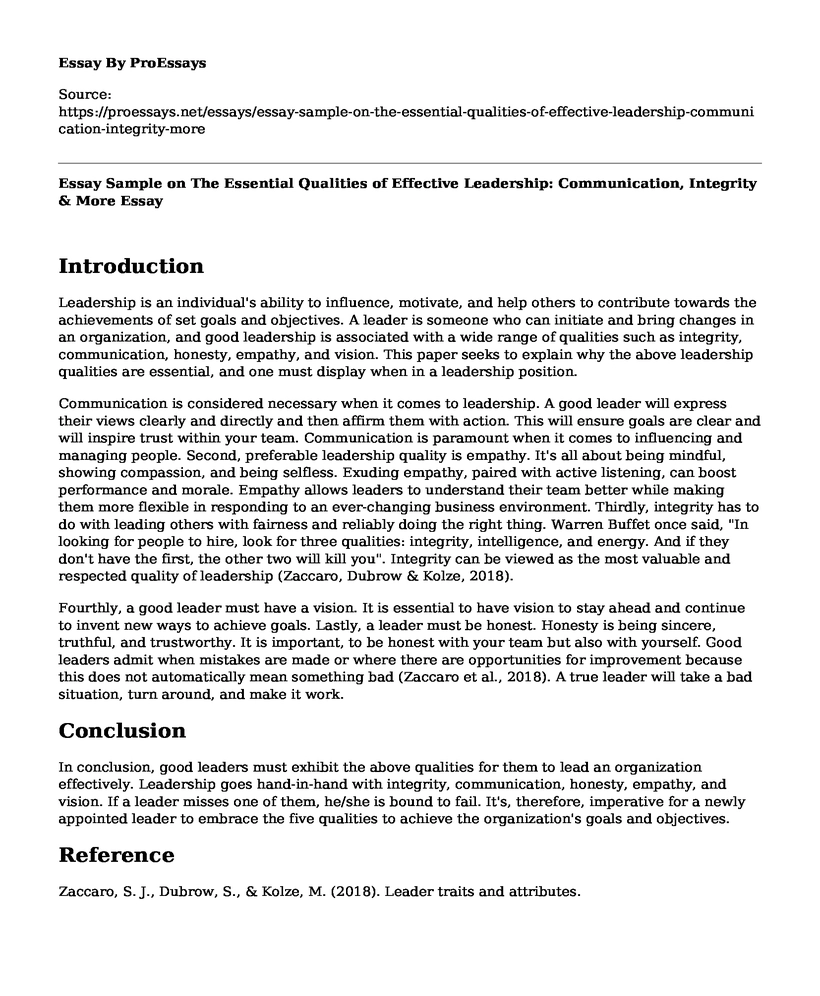Introduction
Leadership is an individual's ability to influence, motivate, and help others to contribute towards the achievements of set goals and objectives. A leader is someone who can initiate and bring changes in an organization, and good leadership is associated with a wide range of qualities such as integrity, communication, honesty, empathy, and vision. This paper seeks to explain why the above leadership qualities are essential, and one must display when in a leadership position.
Communication is considered necessary when it comes to leadership. A good leader will express their views clearly and directly and then affirm them with action. This will ensure goals are clear and will inspire trust within your team. Communication is paramount when it comes to influencing and managing people. Second, preferable leadership quality is empathy. It's all about being mindful, showing compassion, and being selfless. Exuding empathy, paired with active listening, can boost performance and morale. Empathy allows leaders to understand their team better while making them more flexible in responding to an ever-changing business environment. Thirdly, integrity has to do with leading others with fairness and reliably doing the right thing. Warren Buffet once said, "In looking for people to hire, look for three qualities: integrity, intelligence, and energy. And if they don't have the first, the other two will kill you". Integrity can be viewed as the most valuable and respected quality of leadership (Zaccaro, Dubrow & Kolze, 2018).
Fourthly, a good leader must have a vision. It is essential to have vision to stay ahead and continue to invent new ways to achieve goals. Lastly, a leader must be honest. Honesty is being sincere, truthful, and trustworthy. It is important, to be honest with your team but also with yourself. Good leaders admit when mistakes are made or where there are opportunities for improvement because this does not automatically mean something bad (Zaccaro et al., 2018). A true leader will take a bad situation, turn around, and make it work.
Conclusion
In conclusion, good leaders must exhibit the above qualities for them to lead an organization effectively. Leadership goes hand-in-hand with integrity, communication, honesty, empathy, and vision. If a leader misses one of them, he/she is bound to fail. It's, therefore, imperative for a newly appointed leader to embrace the five qualities to achieve the organization's goals and objectives.
Reference
Zaccaro, S. J., Dubrow, S., & Kolze, M. (2018). Leader traits and attributes.
Cite this page
Essay Sample on The Essential Qualities of Effective Leadership: Communication, Integrity & More. (2023, Apr 10). Retrieved from https://proessays.net/essays/essay-sample-on-the-essential-qualities-of-effective-leadership-communication-integrity-more
If you are the original author of this essay and no longer wish to have it published on the ProEssays website, please click below to request its removal:
- Essay Sample on Decision-Making Biases and Pitfalls
- Nature's Grocery and Walmart Grocery Case Study
- The Influence of Groups in Ancient Societies and Cleopatra's Leadership Essay
- Ethical Philosophy That Best Describes the Corporate Culture of Goldman Sachs Paper Example
- Marketing Debate on Product Development Paper Example
- Essay Example on Day-to-Day Decisions in Companies: Short & Long-Term Effects
- Essay on Effective Problem-Solving: Finding Solutions to Issues Quickly & Accurately







